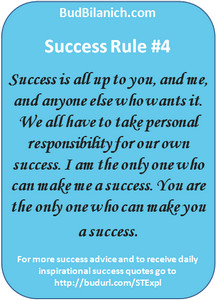 It takes five things to succeed in your career and life: self confidence, positive personal impact, outstanding performance, dynamic communication skills, and interpersonal competence. Each of these is a key factor in becoming successful. However, there is one idea that is so fundamental to success that it is the foundation on which all five of these points rests: personal responsibility.
It takes five things to succeed in your career and life: self confidence, positive personal impact, outstanding performance, dynamic communication skills, and interpersonal competence. Each of these is a key factor in becoming successful. However, there is one idea that is so fundamental to success that it is the foundation on which all five of these points rests: personal responsibility.
It’s simple, really. Success is all up to you, and me, and anyone else who wants it. We all have to take personal responsibility for our own success. I am the only one who can make me a success. You are the only one who can make you a success.
Stuff happens: good stuff, bad stuff, frustrating stuff, unexpected stuff. Successful people respond to the stuff that happens in a positive way. Humans are the only animals with free will. That means we – you and me – get to decide how we react to every situation that comes up. That’s why taking personal responsibility for jumpstarting your career success is so important.
Personal responsibility means recognizing that you are responsible for your life and the choices you make. It means that you realize that while other people and events have an impact on your life, these people and events don’t shape your life. When you accept personal responsibility for your life, you own up to the fact that how you react to people and events is what’s important. And you can choose how to react to every person you meet and everything that happens to you.
The concept of personal responsibility is found in most writings on success. Stephen Covey’s first habit in the 7 Habits of Highly Effective People is, “Be proactive.” My friend John Miller’s book QBQ: the Question Behind the Question asks readers to pose questions to themselves like, “What can I do to become a top performer?” John really believes that taking personal responsibility for your life and career is the key to career success.
The five keys to success – self confidence, personal impact, outstanding performance, communication skills and interpersonal competence – work only if you are willing to take responsibility for your life and career. Personal responsibility is the foundation on which this model is built.
Personal responsibility means using this material once you learn it. I’ve written this book to provide you with useful information and knowledge on becoming a career success. But, as the U.S. Steel pencils my Dad brought home from work used to say, “Knowing is not enough.”
When I was a kid, I was really fascinating and puzzled by these pencils. “Knowing is not enough – what the hell does that mean?” I used to think. I spent hours struggling with that idea. I was too stubborn to ask a grown-up.
When I got to Penn State, I took Philosophy 101 my freshman year. We had to read Johann von Goethe. One day, as I was plowing through an assignment, I came across this quote: “Knowing is not enough, we must do. Willing is not enough, we must apply.”
Boy was I glad I took that course! It solved one of the profound mysteries of my childhood: “Knowing is not enough.” As I take it, you have to take what you learn and use it, or what you’ve learned isn’t very valuable. That’s part of personal responsibility, using your knowledge to achieve your goals.
The other rules in this book will provide you with some ideas on what to do to jumpstart your career success. It’s up to you to think about these rules, decide how you are going to use them, and then to put them to work for you. That’s what personal responsibility is all about.

Speak Your Mind